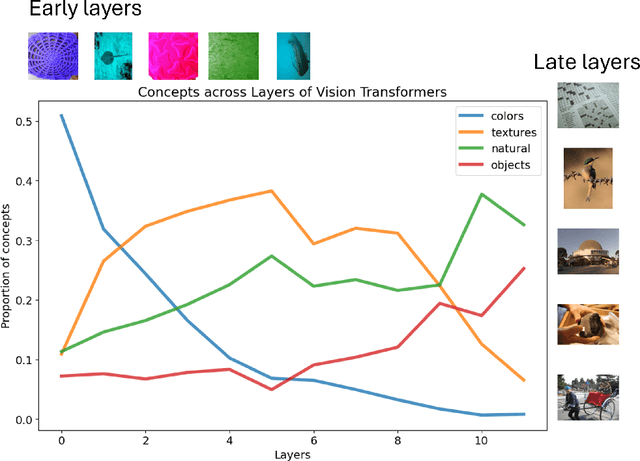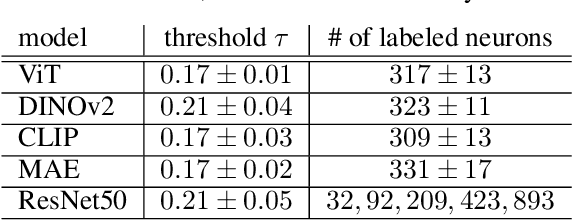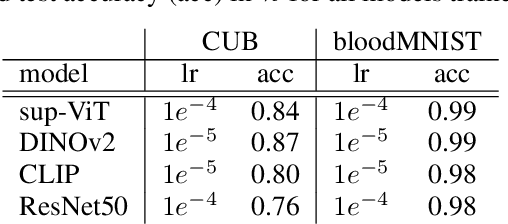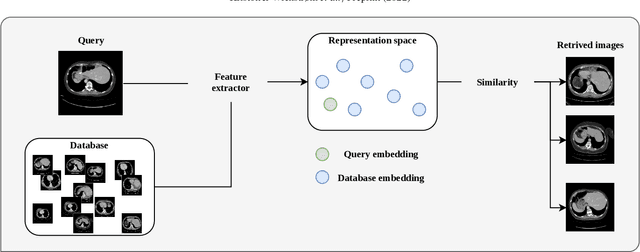Kristoffer Knutsen Wickstrøm
From Colors to Classes: Emergence of Concepts in Vision Transformers
Mar 31, 2025



Abstract:Vision Transformers (ViTs) are increasingly utilized in various computer vision tasks due to their powerful representation capabilities. However, it remains understudied how ViTs process information layer by layer. Numerous studies have shown that convolutional neural networks (CNNs) extract features of increasing complexity throughout their layers, which is crucial for tasks like domain adaptation and transfer learning. ViTs, lacking the same inductive biases as CNNs, can potentially learn global dependencies from the first layers due to their attention mechanisms. Given the increasing importance of ViTs in computer vision, there is a need to improve the layer-wise understanding of ViTs. In this work, we present a novel, layer-wise analysis of concepts encoded in state-of-the-art ViTs using neuron labeling. Our findings reveal that ViTs encode concepts with increasing complexity throughout the network. Early layers primarily encode basic features such as colors and textures, while later layers represent more specific classes, including objects and animals. As the complexity of encoded concepts increases, the number of concepts represented in each layer also rises, reflecting a more diverse and specific set of features. Additionally, different pretraining strategies influence the quantity and category of encoded concepts, with finetuning to specific downstream tasks generally reducing the number of encoded concepts and shifting the concepts to more relevant categories.
Hubs and Hyperspheres: Reducing Hubness and Improving Transductive Few-shot Learning with Hyperspherical Embeddings
Mar 16, 2023



Abstract:Distance-based classification is frequently used in transductive few-shot learning (FSL). However, due to the high-dimensionality of image representations, FSL classifiers are prone to suffer from the hubness problem, where a few points (hubs) occur frequently in multiple nearest neighbour lists of other points. Hubness negatively impacts distance-based classification when hubs from one class appear often among the nearest neighbors of points from another class, degrading the classifier's performance. To address the hubness problem in FSL, we first prove that hubness can be eliminated by distributing representations uniformly on the hypersphere. We then propose two new approaches to embed representations on the hypersphere, which we prove optimize a tradeoff between uniformity and local similarity preservation -- reducing hubness while retaining class structure. Our experiments show that the proposed methods reduce hubness, and significantly improves transductive FSL accuracy for a wide range of classifiers.
A clinically motivated self-supervised approach for content-based image retrieval of CT liver images
Jul 11, 2022



Abstract:Deep learning-based approaches for content-based image retrieval (CBIR) of CT liver images is an active field of research, but suffers from some critical limitations. First, they are heavily reliant on labeled data, which can be challenging and costly to acquire. Second, they lack transparency and explainability, which limits the trustworthiness of deep CBIR systems. We address these limitations by (1) proposing a self-supervised learning framework that incorporates domain-knowledge into the training procedure and (2) providing the first representation learning explainability analysis in the context of CBIR of CT liver images. Results demonstrate improved performance compared to the standard self-supervised approach across several metrics, as well as improved generalisation across datasets. Further, we conduct the first representation learning explainability analysis in the context of CBIR, which reveals new insights into the feature extraction process. Lastly, we perform a case study with cross-examination CBIR that demonstrates the usability of our proposed framework. We believe that our proposed framework could play a vital role in creating trustworthy deep CBIR systems that can successfully take advantage of unlabeled data.
 Add to Chrome
Add to Chrome Add to Firefox
Add to Firefox Add to Edge
Add to Edge